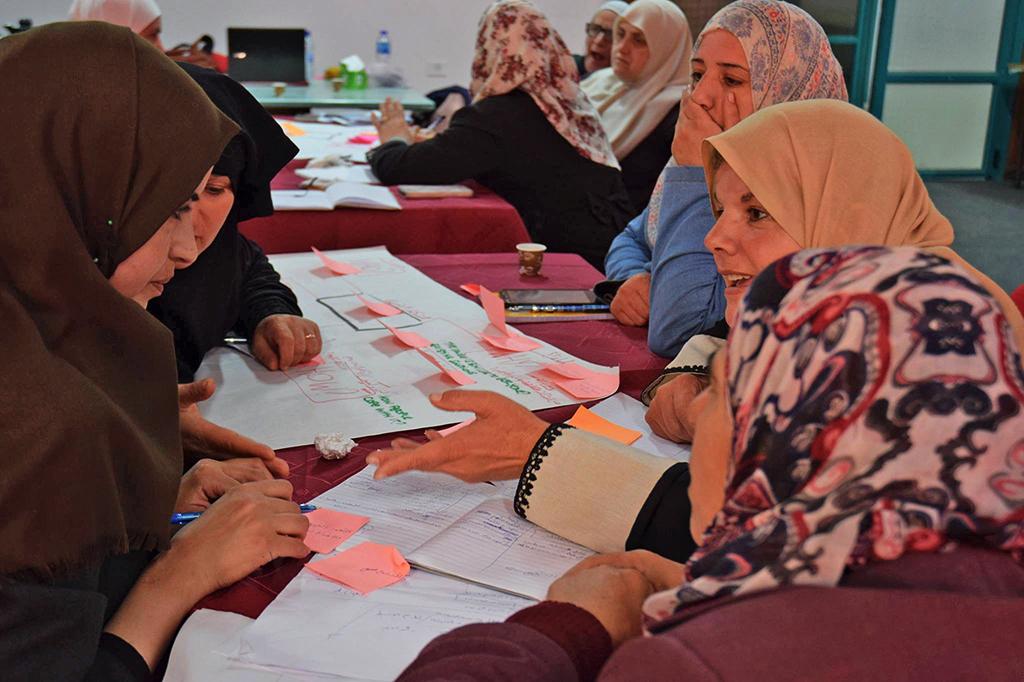SIRCLES highlights an example of project to empower women with disabilities in Palestine

This article forms part of a series of publications under SIRCLES project to support circular economy opportunities for employment and social inclusion in our partner territories Palestine, Lebanon, Spain, Tunisia, Italy, Greece, and Jordan.
A lot of research has highlighted the stigmatization of disability within Palestinian society and how it particularly affects women. Disabled women’s unemployment rate is very high (above 80%) and they are granted insufficient access to educational services, which is reflected both in terms of enrolment rates and academic outcomes. Moreover, Palestinian women with disabilities and mothers of persons with disabilities face several obstacles on a daily basis, among which poor employment opportunities and major difficulties integrating into the social and cultural life, making them among the most vulnerable and marginalized groups in the Palestinian society.
To promote and foster social inclusion and active participation of women with disabilities and mothers of persons with disabilities, ARCO Researchers, SIRCLES project’s partner in Italy, conducted an Emancipatory Research with three different groups of women in Beit Sahour, Ramallah and Nablus in 2015-2016. This participatory approach to the research process emphasizes empowerment through the active involvement of local marginalized groups, raising awareness about the UN Convention on the Rights of Persons with Disabilities and the biopsychosocial approach to disability as well as creating knowledge about the barriers preventing young disabled Palestinian women from a full and effective participation to the job market. In fact, the results of the Emancipatory Research were used by the Italian NGO EducAid to structure project activities aimed at the creation of social enterprises led by young disabled women. In this sense, Emancipatory Research can effectively inform and support projects promoting social inclusion and creating job opportunities for people belonging to vulnerable social categories as people with disabilities, NEETs (Not in Education, Employment or Training) and women, such as SIRCLES project.
The Emancipatory Research
The Emancipatory Research (ER) Methodology is one of the most progressive and innovative approaches within the domain of participatory research. It is a bottom-up process that stimulates a progressive increase in the engagement and the involvement of research subjects in the various steps of the research processes. When the research questions are focused on marginalization and marginalized groups, this approach establishes a mechanism whereby the socially marginalized are encouraged to take active part in the research activities, sharing their opinions and experiences with professional researchers and gaining ownership of the whole research process.
In the ER approach, through the acquisition of research skills and expertise, the research subjects lead all the research activities, from the elaboration of the strategy to the dissemination of the results. In this context, professional researchers become mere scientific facilitators, and this shift in power relations is crucial for allowing individuals to become actively involved in the knowledge production process and increase their influence on decision-making.
Emancipatory Research in Palestine
In the Palestinian context, ER has provided a valuable tool for working simultaneously on promoting the production of knowledge about disability and women with disabilities in the West Bank and empowering the women involved in the research. The ER was part of the project Partip-Action, co-funded by the Italian ministry of Foreign Affairs and International Cooperation (MAECI) and implemented by the Italian NGO EducAid in partnership with RIDS (Italian Network on Disability and Development). The ER involved three groups of women, each of which was composed of around twenty people. In Beit Sahour and Ramallah, the groups were mainly composed of women with disabilities, while the group in Nablus was composed of mothers and sisters of persons with disabilities, as well as workers and volunteers at the local CBR (Community Based Rehabilitation) programmes.
Over the stages of the ER process, ARCO experts encouraged the women to identify the dimensions of wellbeing and the barriers they face through a participatory and collective discussion. The female researchers involved had the opportunity to voice their personal experience and reflect collectively to develop a more general point of view. This participatory approach allowed us to collect both qualitative and quantitative data. The women also took part in analysing and interpreting the results, and their presence was crucial to enhancing the quality of the final research’s conclusion and increasing its depth, as they provided comments and indicated which matters warranted further analysis.
The ER results presented a very complex framework, suggesting alternatives to standard forms of service provision. Given the huge number of relevant factors particular to each person, the study demonstrated that an evaluation of individual resources, values and desires, as well as structuring them into a coherent project for life should be envisaged. In this sense, the empowerment of persons with disability is a prerequisite and a fundamental part of their life project. Interventions based on peer counselling and on self-awareness building are needed to encourage them to formulate a set of realistic objectives that reflect personal beliefs, values and the idea of one’s individual flourishing.
More broadly, the research also showcased all the weaknesses (or even the lack) of public policies aimed at promoting the full and effective participation of persons with disabilities in the Palestinian society. This gap is partly filled by civil society organizations and international cooperation. However, the development of a coherent and sound national policy on disability, ideally elaborated through the participation of DPOs and civil society, is of the utmost importance.
Outcomes of the research
The research proved the potential and relevance of the emancipatory approach for the Palestinian context. Indeed, ER yielded very positive results that are extremely relevant for findings, as the research subjects contributed to it themselves with their personal knowledge of the context and their personal experience of the several forms of deprivation and discrimination, which led to the identification of deeper marginalization dynamics that could have remaining obscure if a standard approach to research had been taken.
References









